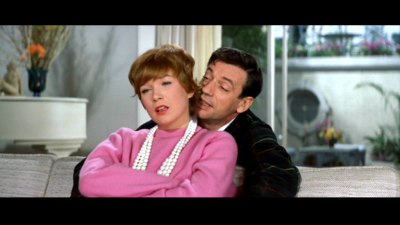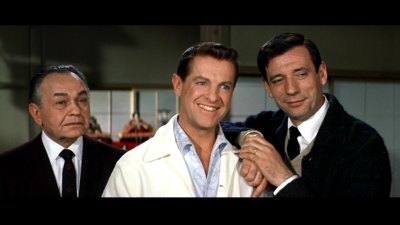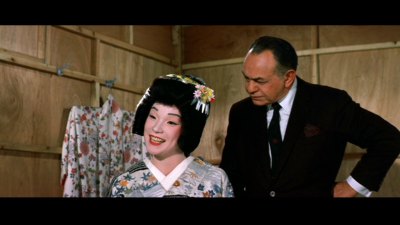| Reviews & Columns |
|
Reviews DVD TV on DVD Blu-ray 4K UHD International DVDs In Theaters Reviews by Studio Video Games Features Collector Series DVDs Easter Egg Database Interviews DVD Talk Radio Feature Articles Columns Anime Talk DVD Savant Horror DVDs The M.O.D. Squad Art House HD Talk Silent DVD
|
DVD Talk Forum |
|
|
| Resources |
|
DVD Price Search Customer Service #'s RCE Info Links |
|
Columns
|
|
|
My Geisha
My Geisha is one of the many expensive misfires that star Shirley MacLaine increasingly found herself appearing in in the 1960s, after her star-making performance in Billy Wilder's The Apartment made her an A-list player. Essentially an I Love Lucy episode without very many laughs, My Geisha is not the "rollicking comedy romp" that's advertised on the back of the DVD cover. At times almost morose, My Geisha always seems to be on the verge of being better than it is, and as such, isn't without interest, but as a light romantic comedy of disguises and complications, it's a fizzle.
Lucy Dell (Shirley MacLaine), is a big-time Hollywood movie star, married to Hollywood director, Paul Robaix (Yves Montand). Unfortunately, Paul feels he's known more for being her husband, as well as the director of all her films, rather than as an artist in his own right. Therefore, he informs his wife and her producer/friend Sam Lewis (Edward G. Robinson), that he wants to go on location to Japan to shoot a realistic version of Madame Butterfly - without Lucy's participation. Paul doesn't feel that Lucy would be believable in the role (a challenge to Lucy's pride as an actress), but more importantly, he wants to prove to himself that he doesn't need her in his films, to be a success.

Once in Japan, Paul finds it difficult to find a Japanese actress who hasn't been influenced by Western culture. Enter Lucy, who wants to put one over on her husband by pretending to be a geisha girl, making him choose her to play the lead in his film. She successfully fools him at a geisha house, and at her initial meeting with Paul, set up by Sam, where she passes herself off as Yoko Mori. After proving her point that she's a good enough actress to fool Paul, Lucy isn't content to just let the joke end there. With Sam's urging, Lucy goes to a famous geisha teacher, Mr. Kaida (Ichiro Hayakawa) to learn the finer points of being a geisha. However, after hearing how many years it takes to fully attain the knowledge and skills that go into becoming a top-flight geisha, it's suggested that one of his best pupils, Kazumi Ito (Yoko Tani) sign on to help guide Lucy through the shooting, giving valuable pointers, as well as translator services, to the lead actress.
Portraying an accomplished geisha girl isn't the only problem Lucy encounters on her new shoot; she must also fend off the advances of her frequent leading man, Bob Moore (Robert Cummings). Bob, who falls in love all the time with his leading ladies, does the same with Lucy/Yoko, at one point almost forcing himself on her until she threatens to kill herself. Bob engages Paul to press his marriage request to Yoko. Paul, feeling comfortable with his leading actress, confesses his feelings of inadequacies being married to Lucy, and tells Lucy/Yoko how important this film is to his self-esteem as an artist and as a man. Unfortunately, an accident at the film laboratories reveals Lucy's identity as Yoko to Paul, and Paul and Lucy must decide what to do with their marriage.
Shirley MacLaine, in one of her autobiographies, states that the film was based in part on the Ferenc Molnar play, The Guardsman, although screenwriter Norman Krasna is credited with the story, too. There's a small element of The Guardsman in My Geisha; with the notion of disguise used to test infidelity among theatre performers evident in the final act of the film. But what My Geisha resembles more than anything is a perverse inversion of a typical I Love Lucy program. A slightly dizzy redhead named Lucy is trying to crash in on her husband's latest theatrical production by disguising her identity, with wacky complications and misunderstandings resulting from her actions. Only here, Lucy is the more famous and accomplished performer, and Paul (who also has trouble with his English, like Ricky), while respected, is seen largely by himself as Mr. Lucy Dell. And what's more, not only does she succeed in her plan (where Lucy Ricardo almost always failed), but Lucy winds up humiliating her husband, not the other way around as was normally the case with Mrs. Ricardo.
Unfortunately, somebody forgot to include the jokes that were so plentiful in I Love Lucy for this romantic comedy. The only flat-out comedic role here is essayed by Robert Cummings, as the dim-witted Lothario movie star, but frankly, his presence here is about as odd as Edward G. Robinson as the producer pal of Lucy. Cummings, an amusing though silly actor at times, is a strange choice to play a famous leading sex symbol; his physicality, as well as his established film persona, doesn't support the role. As for the "comedy" he's supposed to impart, the aggressive "date-rape" scene with MacLaine is decidedly unfunny, and really puts a damper on the rest of the film. Veteran screenwriter Norman Krasna (Bachelor Mother, The Devil and Miss Jones) seems to have forgotten that there has to be something inherently funny in the situation, or at least romantic, for the story to qualify as a romantic comedy. But outside of the dubious sight of MacLaine dressed as a geisha, there's nothing funny about a wife trying to humiliate her husband for no apparent reason. Yes, Paul feels that Lucy is not right for the part of a Japanese geisha - and he's right; she isn't. But that's all he does to hurt Lucy's pride; certainly big time actors hear they're not right for parts all the time, but this slight is enough for Lucy to go to great lengths to tear down her husband, even after hearing (as Yoko) how much Paul loves her, and how important it is for him to stand on his own. Sam's reasoning for Lucy continuing the ruse is that the studio wouldn't have given Paul the amount of money or freedom that he wanted to do the film correctly, but all signs in the film indicate that Paul probably wouldn't have cared about either - as long as he was able to do the film on his own. Looked at coldly (which is the general atmosphere of My Geisha), Lucy's and Sam's actions as written by Krasna are abominable. Lucy Ricardo never went out of her way to upstage Ricky; she only wanted to stand on her own - just as Paul does.

Robinson looks equally lost as the producer. Perhaps most of the blame should be placed on the screenwriter, who only invests Robinson's character with enough motivation to set the farce in motion; once things get sticky, his character has little to say about his involvement in the plot. It's such a bland role for an actor of Robinson's stature that he totally overshadows it, throwing us off-kilter with our expectations. Montand doesn't fare much better; perhaps it was the language barrier that put the uncomfortable looking Montand on the defensive during most of his scenes. He admitted to MacLaine at the start of the shoot that he was worried about his English, knowing that romantic comedy often depending on the rhythm and musicality of the language to get across the genre's attributes to the audience. But as usual with Montand - when he speaks English in a Hollywood film - he comes across as diffident and stiff. There's almost no believable chemistry between him and MacLaine (which may prove the point that involved couples off-screen more often than not don't work well together on-screen). As well, the screenplay gives us almost no scenes of Montand in action on the set (the actual filming of his movie is treated as a series of montages with music over them). If we're not allowed to see Montand as a fully developed character, how can we view him as anything but a grumpy foil for MacLaine's shenanigans?
Perhaps the chief problem with My Geisha - a problem that MacLaine acknowledged worried everybody on the production - was her believability as a Japanese geisha. Let's leave aside the current faddish notion that "ethnic" roles must only be played by an actor of corresponding race (that silly notion insults all actors, puts an unfair burden on the past where such notions were never even considered, and which, if taken to its logical conclusion, would insist only Danish actors play Hamlet, etc.). MacLaine is just simply not believable as the Japanese geisha. Not only does she not look Japanese, but she is so obviously MacLaine, with almost no discernable change in her features except some prosthetic eyelids and heavy white makeup, that we're unable to suspend our disbelief, and go along with Montand never suspecting it's Lucy in disguise. Her dialect, which isn't strong to begin with, floats in and out on such a low volume that you have to wonder what they were thinking when they allowed the scenes to be shot. It's almost as if MacLaine knew she wasn't getting the accent, so she's trying to be as quiet as possible about it. It's not that her intent is to parody or ridicule the accent - she's just inept at executing it. And if I can't believe that Montand doesn't know it's her, then I can't believe the story from page one.

There are a few things in My Geisha that work, foremost among them a sensational appearance by Ichiro Hayakawa as Mr. Kaida, the geisha teacher. This small scene is fascinating for explaining precisely what a geisha is - something that I've never heard fully explained in any other movie. His presence is so quietly commanding, along with an almost invisible mischievous slyness to his line readings, that after he departed, I wished the whole movie had been about him and his teachings with the lovely actress Yoko Tani. Director Cardiff, who is considered one of the greatest cinematographers in film history, certainly makes a good looking film (with the aid of his cinematographer Shunichiro Nakao). My Geisha has a cool, linear design, full of subtle greens and whites, that imparts a stylized, but glossy finish to the film. It's unfortunate, though, that Cardiff couldn't wrangle the material into a cohesive statement either on the romantic comedy genre (which My Geisha barely resembles) or morose domestic drama (which My Geisha looks like all too often, only without the conviction).
The DVDs:
The Video:
My Geisha is presented in a crystal-clear, enhanced for 16:9 TVs, widescreen transfer. It's a great looking film to begin with, and it looks much better here than previous pan-and-scan airings on television. Only an occasional brief color shift here or there belies the film's age.
The Audio:
The audio track for My Geisha is a beautiful Dolby Digital English 5.1 Surround mix. It really comes in handy when MacLaine lipsynchs to Puccini's soaring opera. Franz Waxman's beautiful score, one of his last for a major motion picture, also comes across nicely in the 5.1 Surround mix. There's an optional English mono version (the way it was heard during the film's original theatrical presentation), as well as French and Spanish mono tracks. Subtitles included are English, Brazilian, Portuguese and Spanish.
The Extras:
There are no extras for My Geisha.
Final Thoughts:
My Geisha fails to meet its romantic comedy guidelines, with little help coming from compromised performances by the lead actors. Although the film has an interesting look, a brief travelogue to Japan doesn't save My Geisha from being another high-priced failure from star MacLaine's post-The Apartment period. Rent it if you're a fan of MacLaine, but don't buy it.
Paul Mavis is an internationally published film and television historian, a member of the Online Film Critics Society, and the author of The Espionage Filmography.


|
| Popular Reviews |
| Sponsored Links |
|
|
| Sponsored Links |
|
|
| Release List | Reviews | Shop | Newsletter | Forum | DVD Giveaways | Blu-Ray | Advertise |
|
Copyright 2024 DVDTalk.com All Rights Reserved. Legal Info, Privacy Policy, Terms of Use,
Manage Preferences,
Your Privacy Choices | |||||||















